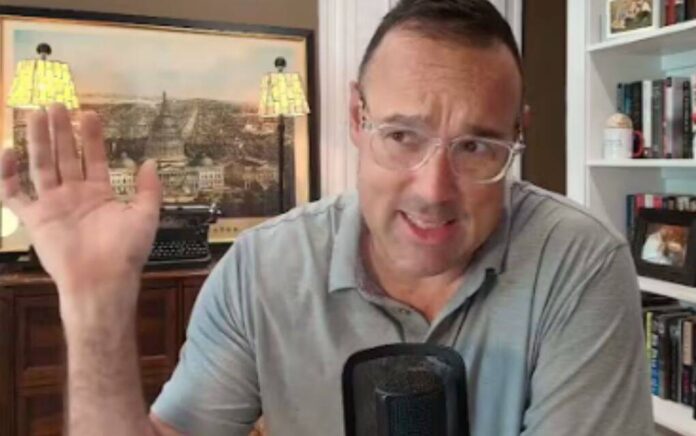
The Democrats were hoping they could regroup for the 2026 midterms. That’s not going to happen.
Even a Democrats are now admitting the party is sinking faster than anyone previously thought.
Democratic Party Faces Historic Lows in Public Support
Chris Cillizza, a political analyst for NewsNation, highlighted on his “So What” Substack that the Democratic Party is grappling with unprecedented challenges due to declining public approval. Surveys conducted by CNN and The Wall Street Journal revealed the Democrats’ favorability ratings at 28% and 33%, respectively. Cillizza described these figures as evidence of “a brand crisis” for the party on his Substack.
“I spend a lot of my time talking about Donald Trump because he’s the president of the United States. He’s the dominant political figure in the country,” Cillizza stated. “And no, his policies and his presidency to date have not proved popular. His approval rating is in kind of the mid-40s. People, as I said in The Wall Street Journal poll, disapprove of how he’s handling inflation, how he’s handling tariffs, how he’s handling immigration, how he’s handling the broader economy.”
Cillizza emphasized the challenge for Democrats, noting, “The problem, of course, is — if you’re a Democrat — is that elections are two options, right? And if the other option, meaning Democrats, is seen as not really an option by the public, that’s a giant problem.” He suggested that recent optimism among Democrats stems from Trump’s unpopularity, with some believing, “‘Well, surely we’re going to win.’ And you might win in 2026 just based on historical trends — the fact that Republicans control everything, people want to send a message, maybe give a little bit of control back to the other party.”
However, Cillizza cautioned that a midterm victory should not be mistaken for public support of the Democratic agenda. “People have no idea really what the Democratic Party stands for. And to the extent that they think they know, they don’t like it, right? So, it’s weak, it’s woke and it’s anti-Trump. That’s what people will say about the Democratic Party,” he remarked.
“That is not getting it done. 33% favorable in the Wall Street Journal poll, 28% favorable in the CNN poll — these are record-low numbers. You cannot — if you are a Democrat — you cannot just say like, ‘Eh, they’ll take care of themselves.’ No. You are in a brand crisis. Make no mistake — this is a crisis of the brand.”
Cillizza urged Democrats to address their core identity, stating, “The Democratic Party is in a terrible place broadly in terms of favorability. You need to — if you’re a Democrat — focus on: What do Democrats stand for? How can they make that message and convince people that they are the party that should be trusted to lead this country in 2026 and especially in 2028?” He added, “And the reality is, looking at numbers like this, they are starting in a big hole — and it’s gotten worse, not better, since the election. And that, to me, if I’m a Democratic Party leader, is very concerning.”
A Puck/Echelon poll from May indicated that likely voters perceive the Democratic Party as “liberal, weak, corrupt,” with even Democratic and Democratic-leaning voters frequently labeling their party as “weak.”
Additionally, a Marist/NPR/PBS News poll from July 1 showed that only 27% of registered voters approved of the performance of Democrats in Congress, a significant drop from 39% in February 2024.
A Quinnipiac University poll conducted on July 16 further underscored the decline, with just 19% of voters approving of congressional Democrats, the lowest figure recorded by the pollster.
Why Swing State Voters View Democrats as Too Radical
In recent years, a growing number of average Americans in swing states and districts have expressed unease with the Democratic Party, perceiving it as increasingly radical and disconnected from their values. This sentiment, particularly in battleground areas like Pennsylvania, Michigan, Wisconsin, and competitive congressional districts, has changed elections forever, influencing electoral outcomes and party strategies. Several factors contribute to this perception, ranging from policy positions to messaging and cultural shifts, which have left many voters feeling alienated.
One key driver is the Democratic Party’s embrace of progressive policies that some swing state voters view as out of step with their priorities. Issues like expansive climate initiatives, such as the Green New Deal, and calls for sweeping social programs, including Medicare for All, have sparked concerns among moderates.
These voters, often focused on economic stability and job security, worry that such policies prioritize ideological goals over practical concerns like affordability and energy reliability. For instance, in industrial states like Ohio and Pennsylvania, where manufacturing and energy sectors remain vital, aggressive environmental regulations are sometimes seen as threats to local economies.
Cultural issues further amplify perceptions of radicalism. Many swing state voters, particularly in suburban and rural areas, feel that Democrats have leaned too heavily into progressive social stances, such as debates over gender identity, critical race theory, and criminal justice reform.
These topics, often framed as “woke” by critics, resonate poorly with voters who prioritize traditional values or feel that such issues are being imposed without sufficient public input. For example, school board battles in states like Virginia have highlighted tensions over educational curricula, with parents accusing Democrats of pushing divisive frameworks.
Economic messaging also plays a role. Swing state voters, many of whom are working-class or middle-class, often perceive Democratic economic proposals as favoring urban elites or marginalized groups over their own needs. Policies like student loan forgiveness or expansive welfare programs, while popular among some Democratic constituencies, can feel exclusionary to those who prioritize fiscal restraint or feel burdened by rising costs. Inflation, a persistent concern since 2021, has further eroded trust, with voters associating Democratic governance with economic mismanagement.



















